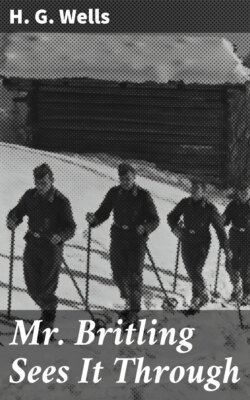Читать книгу Mr. Britling Sees It Through - H. G. Wells - Страница 14
На сайте Литреса книга снята с продажи.
§ 8
ОглавлениеMr. Direck, though he was a little incommoded by the suppression of his story about Robinson—for when he had begun a thing he liked to finish it—found Mr. Britling's household at once thoroughly British, quite un-American and a little difficult to follow. It had a quality that at first he could not define at all. Compared with anything he had ever seen in his life before it struck him as being—he found the word at last—sketchy. For instance, he was introduced to nobody except his hostess, and she was indicated to him by a mere wave of Mr. Britling's hand. "That's Edith," he said, and returned at once to his car to put it away. Mrs. Britling was a tall, freckled woman with pretty bright brown hair and preoccupied brown eyes. She welcomed him with a handshake, and then a wonderful English parlourmaid—she at least was according to expectations—took his grip-sack and guided him to his room. "Lunch, sir," she said, "is outside," and closed the door and left him to that and a towel-covered can of hot water.
It was a square-looking old red-brick house he had come to, very handsome in a simple Georgian fashion, with a broad lawn before it and great blue cedar trees, and a drive that came frankly up to the front door and then went off with Mr. Britling and the car round to unknown regions at the back. The centre of the house was a big airy hall, oak-panelled, warmed in winter only by one large fireplace and abounding in doors which he knew opened into the square separate rooms that England favours. Bookshelves and stuffed birds comforted the landing outside his bedroom. He descended to find the hall occupied by a small bright bristling boy in white flannel shirt and knickerbockers and bare legs and feet. He stood before the vacant open fireplace in an attitude that Mr. Direck knew instantly was also Mr. Britling's. "Lunch is in the garden," the Britling scion proclaimed, "and I've got to fetch you. And, I say! is it true? Are you American?"
"Why surely," said Mr. Direck.
"Well, I know some American," said the boy. "I learnt it."
"Tell me some," said Mr. Direck, smiling still more amiably.
"Oh! Well—God darn you! Ouch, Gee-whizz! Soak him, Maud! It's up to you, Duke. … "
"Now where did you learn all that?" asked Mr. Direck recovering.
"Out of the Sunday Supplement," said the youthful Britling.
"Why! Then you know all about Buster Brown," said Mr. Direck. "He's Fine—eh?"
The Britling child hated Buster Brown. He regarded Buster Brown as a totally unnecessary infant. He detested the way he wore his hair and the peculiar cut of his knickerbockers and—him. He thought Buster Brown the one drop of paraffin in the otherwise delicious feast of the Sunday Supplement. But he was a diplomatic child.
"I think I like Happy Hooligan better," he said. "And dat ole Maud."
He reflected with joyful eyes, Buster clean forgotten. "Every week," he said, "she kicks some one."
It came to Mr. Direck as a very pleasant discovery that a British infant could find a common ground with the small people at home in these characteristically American jests. He had never dreamt that the fine wine of Maud and Buster could travel.
"Maud's a treat," said the youthful Britling, relapsing into his native tongue.
Mr. Britling appeared coming to meet them. He was now in a grey flannel suit—he must have jumped into it—and altogether very much tidier. …
